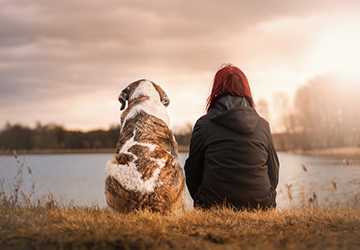How to Keep Your Elderly Companion(Pets) Comfortable and Happy
Our furry companions are more than just pets; they are devoted companions who provide unconditional love throughout their lives. However, pets, like humans, experience the effects of aging. Their bodies and minds change as they age, and just like us, they require specialized care to maintain a senior pet's health and happiness.
Our furry companions are more than just pets; they are devoted companions who provide unconditional love throughout their lives. However, pets, like humans, experience the effects of aging. Their bodies and minds change as they age, and just like us, they require specialized care to maintain a senior pet's health and happiness.
Improving the quality of life for senior pets requires extra effort. They may develop conditions such as arthritis, dental problems, or even vision and hearing loss, which can negatively impact their overall health. Therefore, you must be aware of these changes as a pet owner and adapt to your pets' needs accordingly.

Caring for Aging Pets – Tips for Senior Pet Care
Caring for an elderly pet can be difficult, but it can also be rewarding. In this article, we'll look at practical tips and advice for providing the best care for your senior pet, from nutrition and exercise to grooming and medical care. By following these guidelines, you can ensure that your senior pet spends its golden years in comfort and happiness.
Regular Veterinary
One of the most important things you can do while caring for your aging pet is to take them to the vet for regular checkups. Regular visits to the vet can help catch common health conditions like kidney disease or arthritis early on and ensure that your pet receives timely and appropriate treatment.
During a senior pet exam, the veterinarian may perform a physical exam, bloodwork, and other diagnostic tests to screen for age-related health problems. They may also recommend adjustments to your pet's diet, exercise routine, or medications to help manage any health issues. Depending on your pet's condition, they may need more frequent checkups every six months instead of once a year.
Specialized Diet
As pets age, their dietary needs change. Senior pets may require a specialized diet that is lower in calories and higher in protein to help maintain muscle mass and prevent obesity. Additionally, some senior pets may need a diet that is easier to digest or has added supplements to support joint health, brain function, and other age-related concerns.
Please consult your veterinarian to determine the best diet for your senior pet based on their health needs and lifestyle. They may recommend a specific brand of food or even a homemade diet. Measuring your pet's food and avoiding overfeeding is essential, as obesity can lead to many health problems, such as diabetes and joint pain.

A Relaxing Environment
A comfortable environment for your senior pet can significantly improve their quality of life. Ensure your pet has a comfortable, easy-to-access bed, and consider providing a heated pad or blanket to help soothe aches and pains. Senior pets may benefit from a bed with raised sides for added support.
Additionally, make food and water readily available, and consider using raised feeding bowls to reduce strain on your pet's neck and back. Consider installing a ramp or providing a first-floor living space if your pet has difficulty climbing stairs. Non-slip surfaces like rugs or mats can also help senior pets avoid slips and falls.
Exercise and Mental Stimulation
While these pets may not be as active as their younger counterparts, senior pets' health and happiness depend on exercise and mental stimulation. Short walks or gentle play sessions can help keep your old pet active and mobile, while interactive toys and puzzle feeders can provide mental stimulation and prevent boredom.
However, adjusting your pet's exercise routine is essential based on their health needs. Some senior pets may have arthritis or other mobility issues and need more low-impact activities, such as swimming or gentle stretching. Consult with your veterinarian to determine the best exercise routine.
Senior Pet-specific Products
An excellent tip for senior pet care is to choose old pet-specific products. Several products on the market are specifically designed for senior pets, such as orthopedic beds, joint supplements, and ramps or stairs to help your pet navigate its environment. These products can help improve your senior pet's comfort and mobility and make daily life more enjoyable.
Orthopedic beds provide extra support for senior pets' joints and can help relieve pain. Joint supplements, such as glucosamine and chondroitin, can also help reduce joint pain and inflammation. Ramps or stairs can help senior pets access higher surfaces, such as a bed or couch, without straining their joints.
Plenty of Love and Attention
If you are working toward improving the quality of life for your senior pet, remember to shower them with plenty of attention and affection. As pet owners, we must understand that our senior pets may require more love and watch as they age. Regular grooming, cuddling, and simply spending time in the same room as your senior pet can go a long way in strengthening your bond with them and helping them feel loved and content.
Regular grooming can be essential in showing your senior pet love and attention. As pets get older, they may develop mats or skin irritations. Cuddling with your pet is also an excellent way to express your love and affection for them. Snuggling with their owners is something that many pets enjoy, and it can help your pet feel safe and loved. Spending time in the same room as your pet can also provide them comfort and security. You can help reduce their stress levels and improve their overall well-being by simply being near them.
Conclusion
If you want to keep your elderly pet happy, it is crucial to keep an eye on their behavior and health, so you can find out what they need and when. Aging pets may exhibit changes in their appetite or behavior that could indicate underlying health issues. By caring for your senior pet, offering love and attention, and paying attention to behavioral change, you can help them age gracefully and enjoy their life to the fullest.